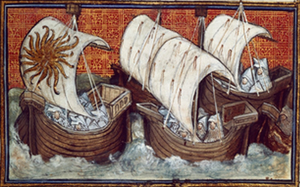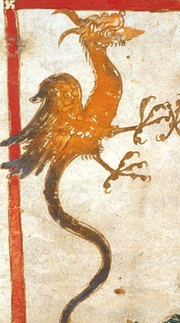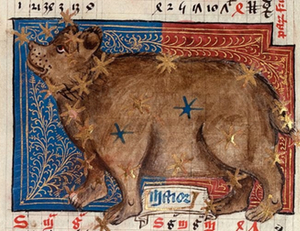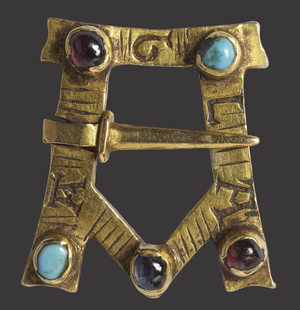
13th-century amuletic brooch: Walters Art Museum, Creative Commons license
King Arthur’s Roman Wars
Siân Echard, University of British Columbia
As you have already seen, the Roman Wars are a decisive moment for the King Arthur of Geoffrey of Monmouth. While much continental romance moves away from this focus, it remains important in the chronicle tradition. This page puts together passages from three of the texts we are reading — Geoffrey’s Historia, the Alliterative Morte Arthure, and Malory’s Morte Darthur — so that you can get some sense of how the role of the Roman Wars might have changed over time. It focuses first on the dream which Arthur has before leaving on his campaign. You might also find our King Arthur and Fortune's Wheel page relevant.
In Book V of his Morte, Malory recounts the story of Arthur’s encounter with the Emperor Lucius of Rome. His main source here is the Alliterative Morte Arthure. You can read an online version of this poem at the TEAMS website. The section reproduced here is Arthur’s dream of the dragon and bear (lines 756-831).
Detail from BL Harley 1319, fol. 18r, by permission of British Library: click the thumbnail to see more about this MS
In a cabane enclosed, clenlich arrayed;
Within on a rich bed restes a little,
And with the swogh of the se in swefning he fell.
Detail from BL Egerton 3028, fol. 25r, by permission of the British Library; click the thumbnail for more about this MS
Him dremed of a dragon, dredful to behold,
Come drivand over the deep to drenchen his pople,
Even walkand out the West landes,
Wanderand unworthyly over the wale ythes;
Both his hed and his hals were holly all over neck;
Ounded of azure, enamelled full fair;
His shoulders were shaled all in clene silver
Shredde over all the shrimp with shrinkand pointes;
His womb and his winges of wonderful hewes,
In marvelous mailes he mounted full high.
Whom that he touched he was tint forever!
His feet were flourished all in fine sable;
And such a venomous flaire flow from his lippes
The flood of the flawes all on fire seemed!
Detail from BL Arundel 66, fol. 33r, by permission of the British Library; click the thumbnail for more about this MS
A black bustous bere aboven in the cloudes,
With ech a paw as a post and paumes full huge
With pikes full perilous, all pliand them seemed;
Lothen and lothly, lockes and other,
All with lutterd legges, lokkerd unfair,
Filtered unfreely, with fomand lippes -
The foulest of figure that formed was ever!
He baltered, he blered, he braundished thereafter;
To batail he bounes him with bustous clawes;
He romed, he rored, that rogged all the erthe,
So rudely he rapped at to riot himselven!

This is the famous clock from Wells Cathedral.
Then wanders the worm away to his heightes,
Comes glidand fro the cloudes and coupes full even,
Touches him with his talones and teres his rigge,
Betwix the taile and the top ten foot large!
Thus he brittened the bere and brought him o live,
Let him fall in the flood, fleet where him likes.
So they thring the bold king binne the ship-borde,
That ner he bristes for bale on bed where he ligges.
Then waknes the wise king, wery fortravailed,
Takes him two philosophers that followed him ever,
In the seven science the sutelest founden,
The cunningest of clergy under Crist knowen;
He told them of his torment that time that he sleeped:
“Dreched with a dragon and such a derf beste,
Has made me full wery, as wisse me Our Lord;
Ere I mon swelt as swithe, ye tell me my swefen!”
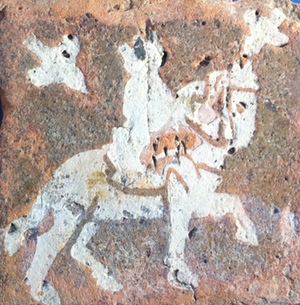
“Sir,” said they soon then, these sage philosophers,
“The dragon that thou dremed of, so dredful to shew,
That come drivand over the deep to drenchen thy pople,
Soothly and certain thyselven it is,
That thus sailes over the se with thy seker knightes.
The coloures that were casten upon his clere winges clear
May be thy kingrikes all, that thou has right wonnen,
And the tattered tail, with tonges so huge, tongues;
Betokens this fair folk that in thy fleet wendes.
The bere that brittened was aboven in the cloudes
Betokenes the tyrauntes that tormentes thy pople
Or elles with some giaunt some journee shall happen,
In singular batail by yourselve one;
And thou shall have the victory, through help of Our Lord,
As thou in thy vision was openly shewed.
Of this dredful dreme ne drede thee no more,
Ne care not, sir conquerour, but comfort thyselven
And these that sailes over the se with thy seker knightes.”
This dream is an elaboration of Geoffrey of Monmouth’s version, in his Historia regum Britannie:
As he lay drowsing, in his sleep he saw a bear flying through the air, at whose growling all shores shook; there was also a terrible dragon, flying in from the west, which illuminated the country with the glow of its eyes. When the one met the other, a marvellous battle occurred. The aforementioned dragon attacked the bear over and over again, burning it with its fiery breath and casting it, entirely burned, down to the earth. Arthur, awaking, described what he had dreamed to those standing about. They, interpreting it, said that the dragon signified him, and the bear some giant with which he was to fight; their battle portended the war to come between them, and the victory of the dragon was that which would come to him. But Arthur, thinking otherwise, conjectured that the vision had come about because of himself and the emperor.
Medieval ideas about warfare affect our reading of Arthur’s later activities in Tuscany. Here are some quotations which reflect some medieval attitudes towards war. First is St. Augustine of Hippo (354-430), in his Contra Faustum Manichaeum, XXII.75 (you can access this and many other writings by Augustine online at the Christian Classics Ethereal Library). To learn more about Augustine, visit James O’Donnell’s Augustine of Hippo site. Augustine is the patron saint of brewers...
A great deal depends on the causes for which men undertake wars, and on the authority they have for doing so; for the natural order which seeks the peace of mankind, ordains that the monarch should have the power of undertaking war if he thinks it advisable, and that the soldiers should perform their military duties in behalf of the peace and safety of the community. When war is undertaken in obedience to God, who would rebuke, or humble, or crush the pride of man, it must be allowed to be a righteous war.... Since, therefore, a righteous man, serving it may be under an ungodly king, may do the duty belonging to his position in the State in fighting by the order of his sovereign – for in some cases it is plainly the will of God that he should fight, and in others, where this is not so plain, it may be an unrighteous command on the part of the king, while the soldier is innocent, because his position makes obedience a duty – how much more must the man be blameless who carries on war on the authority of God, of whom every one who serves Him knows that He can never require what is wrong?
These passages from William of Rennes’ Gesta regum Britanniae, c. 1236 seem doubtful about the possibility that any war, including one being conducted by Arthur, could be considered just:
“What madness, oh brave men! Is that perpetual kingdom to be lost for an earthly one? You will lose on both sides through your excess. Britain should be content with its own borders. Rome, too, should not seek to exact tribute unjustly.”
“I fear Arthur, who fought a duel with the tribune Frollo and killed him; Lot, Cador, Auguselus, Kay, Gawain, Hoel: the sound alone of those names terrifies me. No house is without wailing, no street without lamentation; female voices and plaints strike the sky, a resounding echo repeats the horrendous uproar. The grieving wife performs the rites for her husband while yet he lives.”
Finally, compare the description of Arthur’s Tuscan campaign in Malory with that in the Alliterative Morte :
Than into Tuskayne he turned whan he tyme semed, and there he wynnys towrys and townys full hyghe, and all he wasted in his warrys there he away ryddys. Than he spedys towarde Spolute with his spedfull knyghtys, and so unto Vyterbe he vytayled his knyghtes, and to the vale of Vysecounte he devysed there to lygge in that vertuouse vale amonge vynys full.
(Winchester MS version of Malory's Morte Darthur)
Into Tuskane he turnes when thus wel timed,
Takes townes full tite with towres full high;
Walles he welt down, wounded knightes,
Towres he turnes, and tourmentes the pople,
Wrought widowes full wlonk wrotherayle singen,
Oft werye and weep and wringen their handes;
And all he wastes with war ther he away rides;
Their welthes and their wonninges wandreth he wrought!(Alliterative Morte Arthure, lines 3150-3157)
If you are interested in learning more about medieval warfare, a good place to start is De Re Militari, the website of the Society for Medieval Military History. There is an extensive collection of links in the Online Resources section, and there is also a collection of online Primary Sources, organized chronologically by century.
